by DAVID ROLINSON
Play for Today Writer: Colin Welland; Director: Alan Clarke; Producer: Graeme McDonald
“It’s as if he’s in constant chaos, reaching out for outstretched hands that just crumble in his grasp…”
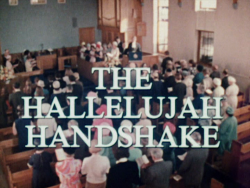 Not until the end of The Hallelujah Handshake do we discover the real identity of its central character, David Williams (played by Tony Calvin).1 A petty criminal and small-time thief on a repetitive cycle of police warnings and short prison sentences, Williams is an inveterate liar. A lonely storeman (or, perhaps, storyman), he passes himself off as Henry Tobias Jones (a touring writer who has visited the Bahamas and once had a football trial), John Rhys Davies (Welsh BBC Orchestra) and others. I have given away the ending here not to “explain” David, but to draw attention to the play’s refusal to do so. This is one of the reasons that Colin Welland’s play is so fascinating and so deceptively complex.
Not until the end of The Hallelujah Handshake do we discover the real identity of its central character, David Williams (played by Tony Calvin).1 A petty criminal and small-time thief on a repetitive cycle of police warnings and short prison sentences, Williams is an inveterate liar. A lonely storeman (or, perhaps, storyman), he passes himself off as Henry Tobias Jones (a touring writer who has visited the Bahamas and once had a football trial), John Rhys Davies (Welsh BBC Orchestra) and others. I have given away the ending here not to “explain” David, but to draw attention to the play’s refusal to do so. This is one of the reasons that Colin Welland’s play is so fascinating and so deceptively complex.
Colin Welland, a former teacher, BBC North newscaster and club comedian, got his big break as an actor in the police drama series Z Cars. Encouraged by Ken Loach – for whom Welland would appear in Kes – Welland moved into scriptwriting, with such immediate success that the Radio Times described him as “a TV phenomenon”.2 Taking his place among the Play for Today generation, Welland shared a belief that “In television there is a greater need for a different technique from actors, producers, directors and writers. People like Ken Trodd who learnt his job in television and thinks in television terms”.3 The Hallelujah Handshake would be one of four plays for which he won an SFTA Award for best script, along with Slattery’s Mounted Feet, Say Goodnight to Your Grandma and Roll on Four O’ Clock.4 According to Welland, The Hallelujah Handshake was the first piece not to have “come straight out of my own background and experience”, but he was still utilising his talent for observation, which had prompted friends who saw Bangelstein’s Boys to say “You didn’t write that – you remembered it!”5 In his local area of Barnes, Welland “was very pally with a methodist minister here and he told me the story about this man who everybody tried to help but was totally without any responsibility… you would find yourself let down by him and troubled by him and yet he had a charm and enthusiasm”.6 Indeed, the Commissioning Brief for the story names the minister, noting that the then-untitled play “is based on information supplied by” him and that “the author must obtain written clearance for use of that material”.7 The play was commissioned on 14 October 1969 with a target delivery date of 31 January 1970.8
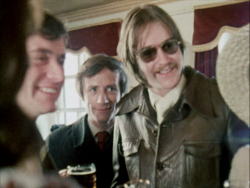
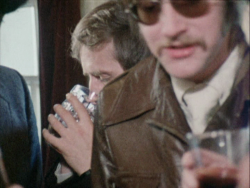 We first glimpse Henry in a pub apparently with friends, but something seems wrong. Clarke neatly expresses Henry’s alienation from the others through changes in positioning and framing, moving tighter on Henry’s lost expression, with the other characters becoming almost nebulous in their foregrounding in the frame, just shoulders that expel him. It is an effective device, expressing the play’s two vital elements: firstly, that the lonely Henry has tried to join a community but is estranged from it, and secondly that we too are estranged from him, watching from the outside with no privileged access to his thoughts. The scene is intercut with sequences from the community that he will go on to join, a Methodist congregation involved in the “fellowship” of “communal worship”. Their hymns are held over shots from the pub, as if enveloping Henry in that fellowship, offering the sanctuary of the hallelujah handshake. Unlike Henry’s, the congregation’s thoughts are accessed, dipped into during the hymn through interior monologues: “comfort me, God, I’m lonely”; “Please, God, a baby”; “Must remember to put the lamb in early…”. The vicar describes “the gift of love” as “the foundation of true happiness”. It is this “gift of love” that Henry seeks, walking into the church’s Old Folks Social “right out of the blue”.
We first glimpse Henry in a pub apparently with friends, but something seems wrong. Clarke neatly expresses Henry’s alienation from the others through changes in positioning and framing, moving tighter on Henry’s lost expression, with the other characters becoming almost nebulous in their foregrounding in the frame, just shoulders that expel him. It is an effective device, expressing the play’s two vital elements: firstly, that the lonely Henry has tried to join a community but is estranged from it, and secondly that we too are estranged from him, watching from the outside with no privileged access to his thoughts. The scene is intercut with sequences from the community that he will go on to join, a Methodist congregation involved in the “fellowship” of “communal worship”. Their hymns are held over shots from the pub, as if enveloping Henry in that fellowship, offering the sanctuary of the hallelujah handshake. Unlike Henry’s, the congregation’s thoughts are accessed, dipped into during the hymn through interior monologues: “comfort me, God, I’m lonely”; “Please, God, a baby”; “Must remember to put the lamb in early…”. The vicar describes “the gift of love” as “the foundation of true happiness”. It is this “gift of love” that Henry seeks, walking into the church’s Old Folks Social “right out of the blue”.
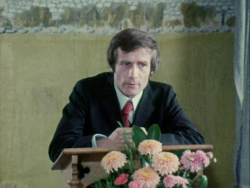 Henry’s arrival, after the congregation has been described as “too cosy, too insular”, recalls the device often used by Dennis Potter, the outsider at the door almost called up by those within. As John Lawrence noted, the play employed the familiar trope of “the stranger in the midst of a structured community”.9 Henry is welcomed into the group, but seems too keen to please, sings slightly too lustily, embroiders his personal history too enthusiastically. He volunteers a talk about the Bahamas, but it becomes clear he’s never been; he conducts a choir with tremendous vigour but embarrassing inexpertise. He recruits children into Sunday school, and gives them a thunderous, disturbing lecture on sin, to the point of foaming at the mouth. This scene exemplifies the skill shown by lead actor Tony Calvin, who superbly executes shifts in pace and empathy throughout. “The whole difficulty of the piece”, according to its AFM Graham Benson, “was casting this lead role – a man slightly disturbed, and with a heightened imagination, capable of immense confidence and desperate shyness”.10
Henry’s arrival, after the congregation has been described as “too cosy, too insular”, recalls the device often used by Dennis Potter, the outsider at the door almost called up by those within. As John Lawrence noted, the play employed the familiar trope of “the stranger in the midst of a structured community”.9 Henry is welcomed into the group, but seems too keen to please, sings slightly too lustily, embroiders his personal history too enthusiastically. He volunteers a talk about the Bahamas, but it becomes clear he’s never been; he conducts a choir with tremendous vigour but embarrassing inexpertise. He recruits children into Sunday school, and gives them a thunderous, disturbing lecture on sin, to the point of foaming at the mouth. This scene exemplifies the skill shown by lead actor Tony Calvin, who superbly executes shifts in pace and empathy throughout. “The whole difficulty of the piece”, according to its AFM Graham Benson, “was casting this lead role – a man slightly disturbed, and with a heightened imagination, capable of immense confidence and desperate shyness”.10
However, Welland has argued that the casting did not entirely reflect the person it was based on, as “he was very very suave and totally presentable and without any obvious problems, whereas the one that [Clarke] cast in the play… you would have had suspicions about him, you know… this fella was just an ordinary, straightforward fella who’d arrived at the church and asked ‘Is there any way I can help’, you know? Lots of people would grab at the opportunity and then he would do all sorts of daft things”.11 George Melly noted that here, as in Roll On Four O’ Clock, “Welland has explored a new theme, the misfit and the antagonism he arouses in those who conform… [previously] it was the clash between love and the gang which occupied him, now the loner has taken the place of the couple as the threat”.12 Menacingly, the vicar Geoff – in voice-over, from some as-yet undisclosed future – stresses that Henry, in spite of his lies, was “no danger” yet. And he isn’t, except through the way others view him. We come to suspect his enthusiasm for children, through subtle – almost subliminal – signifiers. Does he hold that child tightly with more than natural affection? Should he dance so vigorously to the Rolling Stones’ Live With Me (“don’t you think there’s a place for you between the sheets?”) in a youth club?
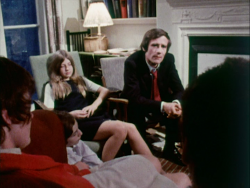 On one level, The Hallelujah Handshake is a moving study of loneliness. Henry’s is so pervasive that it can no longer be cured by meeting people. He watches football with a friend’s family, and seems to have found companionship. But the scene changes as he reaches out emotionally, heightened by Clarke’s editing, abruptly cutting to the family later in the day, their body language tense, their energy worn down as Henry speaks: “People ignore me, usually, or get aggressive. It’s always been like that, nobody’s ever listened – makes you think, you know, wonder if you’ve anything to say, you know, interesting, worthwhile… Nobody tells you, you see, who you are, you just agree with everybody… But here today, you’ve all listened”. This brings to mind Welland’s role in Ken Loach’s film Kes released a year earlier – as Mr Farthing, he was the only adult to listen to Billy Casper, but whereas he helped Billy find his true voice, Henry’s identity is (according to another description of him) “in limbo”.
On one level, The Hallelujah Handshake is a moving study of loneliness. Henry’s is so pervasive that it can no longer be cured by meeting people. He watches football with a friend’s family, and seems to have found companionship. But the scene changes as he reaches out emotionally, heightened by Clarke’s editing, abruptly cutting to the family later in the day, their body language tense, their energy worn down as Henry speaks: “People ignore me, usually, or get aggressive. It’s always been like that, nobody’s ever listened – makes you think, you know, wonder if you’ve anything to say, you know, interesting, worthwhile… Nobody tells you, you see, who you are, you just agree with everybody… But here today, you’ve all listened”. This brings to mind Welland’s role in Ken Loach’s film Kes released a year earlier – as Mr Farthing, he was the only adult to listen to Billy Casper, but whereas he helped Billy find his true voice, Henry’s identity is (according to another description of him) “in limbo”.
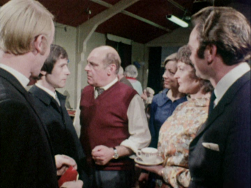 Whose fault is it that nobody responds to his “cry from the wilderness”? For John Lawrence, the play’s point was that “no matter how aware people are of someone asking them for help, no matter how much they say they want to do so… they are not prepared to… sacrifice, no matter how small”.13 Nancy-Banks Smith had a different interpretation: “I knew such a man once and let him down, as such men are always let down, because, though they give lavishly, they expect too much. It always seems too much. It may not be. They are like this… So giving, so demanding, so devoid of any sense of guilt…”14 The beginning of the end for Henry comes when the worried parents of children in his care demand his “full case history”. The audience too would like some “case history” – so far we have been told only what other characters think about him. It’s as if he can’t give details because he lacks a sense of his own identity. Only as Henry can he bellow the words of the hymn, “This is my story, this is my song” (maintaining the skilful use in much of Welland’s work of songs to reflect character), or that it isn’t as interesting a story to tell. He has also committed thefts, but the fact that these are not shown reinforces the sense that this is not why he “conned” his way into the community; nor, perhaps, why they expel him. Trust works both ways – having reached out for love, he is told that “we think you need treatment”.
Whose fault is it that nobody responds to his “cry from the wilderness”? For John Lawrence, the play’s point was that “no matter how aware people are of someone asking them for help, no matter how much they say they want to do so… they are not prepared to… sacrifice, no matter how small”.13 Nancy-Banks Smith had a different interpretation: “I knew such a man once and let him down, as such men are always let down, because, though they give lavishly, they expect too much. It always seems too much. It may not be. They are like this… So giving, so demanding, so devoid of any sense of guilt…”14 The beginning of the end for Henry comes when the worried parents of children in his care demand his “full case history”. The audience too would like some “case history” – so far we have been told only what other characters think about him. It’s as if he can’t give details because he lacks a sense of his own identity. Only as Henry can he bellow the words of the hymn, “This is my story, this is my song” (maintaining the skilful use in much of Welland’s work of songs to reflect character), or that it isn’t as interesting a story to tell. He has also committed thefts, but the fact that these are not shown reinforces the sense that this is not why he “conned” his way into the community; nor, perhaps, why they expel him. Trust works both ways – having reached out for love, he is told that “we think you need treatment”.
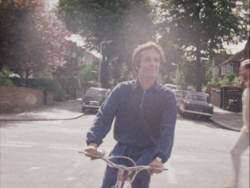 So, John (as he now calls himself) leaves – moving on to another congregation, this time the grander and more ritualistic Anglo-Catholic – and develops another story, gaining another position of trust, soon giving Communion. His happiness is expressed through mobility, through a breezy bike ride (a scene which is echoed later, and similarly interrupted, in Clarke’s Penda’s Fen). But he is comically pursued by Geoff, who is so determined to “help” Henry that he warns Reverend Whitehead that “he’ll bring your church down”.
So, John (as he now calls himself) leaves – moving on to another congregation, this time the grander and more ritualistic Anglo-Catholic – and develops another story, gaining another position of trust, soon giving Communion. His happiness is expressed through mobility, through a breezy bike ride (a scene which is echoed later, and similarly interrupted, in Clarke’s Penda’s Fen). But he is comically pursued by Geoff, who is so determined to “help” Henry that he warns Reverend Whitehead that “he’ll bring your church down”.
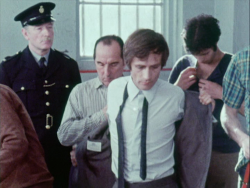 Whitehead cannot be persuaded, arguing that “it’s because people have pasts that they come to us”. Ultimately, Henry/John’s thieving strikes again, as he vanishes with a raffle’s first prize. It is an odd act – vaguely Christian since he sells it to an old woman in need of it, but also a self-defeating betrayal of trust. His identity is scrubbed clean in prison – in an echo of the opening sequence, a shot of him washing is overlaid with the soundtrack of Whitehead’s congregation, a goodbye handshake as the community washes its hands of him.
Whitehead cannot be persuaded, arguing that “it’s because people have pasts that they come to us”. Ultimately, Henry/John’s thieving strikes again, as he vanishes with a raffle’s first prize. It is an odd act – vaguely Christian since he sells it to an old woman in need of it, but also a self-defeating betrayal of trust. His identity is scrubbed clean in prison – in an echo of the opening sequence, a shot of him washing is overlaid with the soundtrack of Whitehead’s congregation, a goodbye handshake as the community washes its hands of him.
At one point, a child asks, “Why does Mister Jones tell lies?” It’s a keynote question that sets an agenda similar to that of the last line of Orson Welles’s Touch of Evil (“He was some kind of a man. What does it matter what you say about people?”) or the journalist scenes in Citizen Kane. The play’s structure is an investigation into its central character’s motivations, with interviews commenting on past events. This raises similar themes – identity and perception, whether we ever really know anyone, and how we understand ourselves and each other through the telling of stories. If Henry’s identity is “in limbo”, this limbo is the space between his character and the way others judge him.
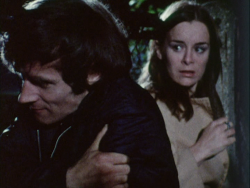 The child’s question is a call to understand, rather than judge, him, and as such is lost on adults. It’s a direct question allowing for none of the evasiveness of adult relationships – portrayed most disturbingly in a scene between Henry and Jim’s wife, Brenda, both of whom have “a hole in your life”. She is desperate for a baby, he for companionship; she seems to chat him up, he offers to provide her baby. Temporal ellipses again confuse. Clarke cuts to shots with no narrative motivation – Henry at the children’s playgroup, little girls on swings. And then, brutally, he cuts to the irretrievable breakdown of the argument, and Henry’s outburst against her “ogling me… undressing me. Why don’t you leave me alone? Please leave me alone!” The scene raises questions about “David”‘s story, but these aren’t followed up. The play refuses to judge or even articulate his thought processes. So why does he tell lies? The question follows his failed appeal to be embraced into the family, to “sit in your branches”, and as such implicates an increasingly alienating society – as Matthew Coady put it, “we are all to blame”.15 Looking back at Henry’s speech (above), the repetition of “you know” and “you see” is striking because they, and we, don’t – and the plot repetitions reinforce the idea that we never will. The play ends with Henry striding off with his latest community, the Salvation Army. In spite of everything, if that way lies salvation, we hope he finds it.
The child’s question is a call to understand, rather than judge, him, and as such is lost on adults. It’s a direct question allowing for none of the evasiveness of adult relationships – portrayed most disturbingly in a scene between Henry and Jim’s wife, Brenda, both of whom have “a hole in your life”. She is desperate for a baby, he for companionship; she seems to chat him up, he offers to provide her baby. Temporal ellipses again confuse. Clarke cuts to shots with no narrative motivation – Henry at the children’s playgroup, little girls on swings. And then, brutally, he cuts to the irretrievable breakdown of the argument, and Henry’s outburst against her “ogling me… undressing me. Why don’t you leave me alone? Please leave me alone!” The scene raises questions about “David”‘s story, but these aren’t followed up. The play refuses to judge or even articulate his thought processes. So why does he tell lies? The question follows his failed appeal to be embraced into the family, to “sit in your branches”, and as such implicates an increasingly alienating society – as Matthew Coady put it, “we are all to blame”.15 Looking back at Henry’s speech (above), the repetition of “you know” and “you see” is striking because they, and we, don’t – and the plot repetitions reinforce the idea that we never will. The play ends with Henry striding off with his latest community, the Salvation Army. In spite of everything, if that way lies salvation, we hope he finds it.
The play was largely well reviewed, although I want to end on a negative statement from John Lawrence:
Colin Welland has a strong sense of how people talk and behave, Alan Clarke an equally strong sense of how they move, but these two qualities remained separate, with the result that the community was in the end, an artificial one, existing only to tell this story.16
Although I don’t agree with his conclusion, Lawrence’s separation of writer and director is interesting. It touches upon their respective talents, for instance noting Clarke’s interest in, and use of, movement. However, at that time writers were prioritised by critics as the controlling source of their play’s meaning. As George Melly put it, “Welland is an important playwright and, more relevantly, an important television playwright, and they’re not so thick on the ground”.17 This is all true, and this is one of Welland’s many excellent scripts18, but Clarke is dedicated to both “serving” and enhancing it. An “extraordinary and intense piece”, The Hallelujah Handshake shows the art of collaboration – between writer, director and the institutional structure of Play for Today – close to its peak.
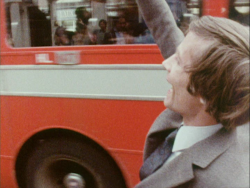
The crew reflected in the bus window – who’s that directing the bus to move (the one pointing screen left?)
The Hallelujah Handshake was released on DVD and blu-ray by the BFI in 2016, in their excellent Alan Clarke collection.
Originally posted: 1 July 2003 on the old Mausoleum Club version of this site.
Updates:
2006: transferred to the old University of Hull version of this site.
2009: transferred to new Play for Today mini-site initially separate from the British Television Drama site
4 November 2010: first appearance of this essay on the main British Television Drama site, moved from a different URL, as all the pieces from the old mini-site were transferred to the main site.
4 January 2014: added commissioning information.
31 March 2016: added broadcast date (in line with the usual practice on this site) and time in endnote.
10 July 2016: added images, accommodated by breaking up some paragraphs.
5 February 2017: added link to BFI release.
4 March 2017: standardised presentation of ‘Updates’ legacy information (2003, 2006, 2009) in line with current site practice.
This piece is an early draft version of a section on The Hallelujah Handshake which later appeared in revised form in my book Alan Clarke (Manchester: Manchester University Press, 2005), but with subsequent additions and revisions.

Pingback: Funny Farm (1975) | British Television Drama